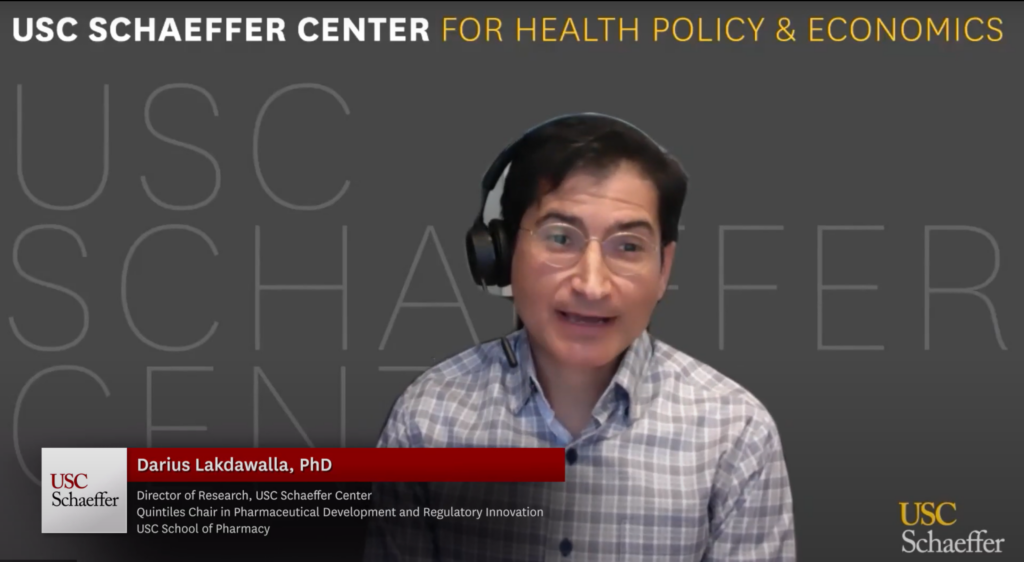Health technology assessment (HTA) can be an effective tool for evaluating the value and appropriate pricing of treatments and technologies. “But, unlike other advanced nations, the United States does not have a coordinated process to evaluate the effectiveness and value of new devices, medicines or procedures,” according to Ruth Katz, vice president and executive director of the Aspen Institute’s Health Medicine and Society program.
The USC Schaeffer Center and the Aspen Institute convened a year-long advisory panel aimed at addressing these deficiencies and providing recommendations for how HTA could be improved in the U.S. healthcare system.
On June 8, 2021, the chairs of that panel—Gail Wilensky, Peter Neumann and Darius Lakdawalla—gathered for a webinar to discuss the resulting white paper’s recommendations. Rachel Cohrs, Washington correspondent for STAT, moderated the discussion.
Beyond Medicine
Wilensky, Lakdawalla and Neumann chaired the panel of 19 experts from across the public and private sectors that were tasked with developing strategies for using HTA to promote healthcare value and quality. The resulting white paper recommends an advisory HTA body, the Institute for Health Technology Assessment, that would fill critical gaps in knowledge for providers, payers, policymakers, and patients.
An HTA should “be advisory to payers—public and private—about the value of new technologies,” said Wilensky, a senior fellow at the international health foundation Project HOPE whose previous experience includes serving in the George H.W. Bush administration. She added that the focus must extend beyond medicine to “take a broader look at technology in terms of procedures and interventions.”
Darius Lakdawalla, Schaeffer Center director of research and the Quintiles Chair in Pharmaceutical Development and Regulatory Innovation at the USC School of Pharmacy, noted that “since information is a public good, there is a natural role for government—not instead of a private system for developing HTA information but in addition to it.”
“We also emphasize that there are existing private HTA efforts in the United States and that they should continue,” said Peter Neumann, director of the Center for the Evaluation of Value and Risk in Health at the Institute for Clinical Research and Health Policy Studies at Tufts Medical Center. “This body ideally should help fill in the gaps and not duplicate efforts,” he added of any new HTA agency.
Uniqueness of Healthcare in the U.S.
“CMS always welcomes health technology assessments … especially ones, as you’ve outlined, which would minimize bias or stakeholder influence,” said Lee Fleisher, chief medical officer and director of the Center for Clinical Standards and Quality for the Centers for Medicare & Medicaid Services (CMS). “And we feel that any information that’s reliable will be beneficial not only to us as payers but importantly to patients, caregivers and the clinical teams.”
Adrian Towse, director emeritus of the United Kingdom Office of Health Economics, noted that, compared to other nations, “the unique thing about the U.S. is the complexity and the numbers of customers that we’ve got in terms of plans, payers and providers.” However, he added, a customer base exists that is asking for something like the proposed HTA and would “use this evidence [to] actually change U.S. healthcare.”
Metrics and Impact
Lakdawalla and Neumann noted that an independent HTA body could be leveraged to evaluate technologies, medicines, procedures and public health interventions. Currently, there are no economic incentives for conducting such assessments.
Considering such metrics as quality of life, Lakdawalla called HTA “a way of capturing a broad range of tradeoffs in a single measure, acknowledging that the issues raised will “always be controversial and complicated.”
However, Neumann noted that any metric comes with downsides, suggesting “it would be wise to recommend disaggregated measures, not to have the focus solely be on quality.”
A disaggregated format “allows different decision-makers to take potentially different views about the assessment of a particular technology,” Wilensky added. The HTA’s advisory nature, meanwhile, puts such decisions where they belong, she said—in the hands of the public or private payers.
The panelists agreed that any HTA should remain as independent as possible and not get caught up in political or funding debates. Lakdawalla also noted that HTA “is not a particularly expensive activity compared to actually paying for healthcare.”
